One of the first things most pool owners learn to do for themselves is replacing their own pool pump. Why pay someone to do something you can learn to do yourself? For above ground pool owners, replacing your above ground pool pump may seem daunting. There are a ton of different pump options and features that affect your overall plumbing schematic. How do you know which pump is right? The mere fact that you’re ordering it online does not help the situation either. If you order the wrong pump, you have to send it back, further delaying getting your pool back. No one wants to order the wrong pump, lose time or spend too much money in the process.
Do you think replacing your above ground pool pump is hard? Well, let’s simplify it together.
What To Check When Replacing Your Above Ground Pool Pump

Whenever you replace your above ground pool pump, there are a few things you need to consider before making your purchase. For example, is your pump too large for your filter? Do you need a vertical or a horizontal discharge? Also, what type of cord connection do you need? These questions should have an answer BEFORE you make your purchase. Failing to address one of these areas has the potential to affect which pump you choose.
Horsepower
One of the first questions we often hear when pool owners are looking to replace their pump is, “Should I increase the horsepower on my pump?” Everyone seems to think that they need a bigger pump or that a bigger pump is better for their pool. In most cases, you do not need a bigger pump. Ask yourself two questions:
-
Do I have any issues filtering my pool? (Can’t get rid of algae)
-
Do I have any circulation issues
If you answered NO to both questions, then you absolutely DO NOT need a bigger pump. Sure, there are times when it is necessary to purchase a larger pump. However, before shelling out more money on a larger pump, double-check your calculations to ensure it is absolutely necessary. For a more in-depth conversation on what size pump you need, check out our other related blog posts.
- Sizing Your Above Ground Pool Pump
- Can I Go With a Higher Horsepower Pump?

Vertical or Horizontal Discharge?
One of the key areas that above ground pool owners neglect is determining if they need a vertical or a horizontal discharge. First, let’s take a step back. Do you know what we mean by horizontal and vertical discharge? Honestly, the best way to discern which one you need is to look at it.
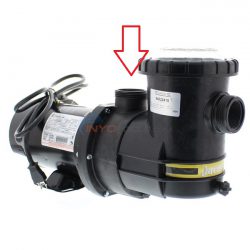
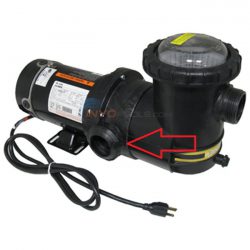
Unfortunately, we cannot tell you which one you need. Every pool setup is different, making it difficult for us to recommend one to you. Typically, the plumbing is already in place and your discharge all depends on your blueprint. Some pumps, like the Hayward Matrix, have rotating discharges. This means the pump is versatile, installing either vertically or horizontally. Choosing a pump with multiple discharges gives pool owners more plumbing flexibility and ensures you don’t purchase the wrong one.
Cord Type
There are two different types of cords to choose from when purchasing an above ground pump: 3-prong and twist lock. Much like the discharge on the pump, selecting the wrong plug type can delay your installation. How can you determine which plug you need? Again, it’s just a simple matter of looking at your current setup.
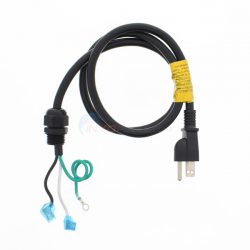
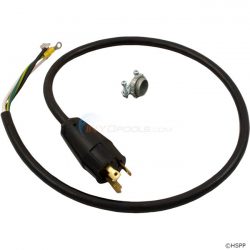
Most pool owners are familiar with the standard 3- prong cord, however, the twist-lock cord might be a new concept for you. The twist lock cord does exactly what the name implies. You have to twist the cord until it locks in place. It’s considered a safer option for the 3-prong. But what happens if you currently have a twist-lock cord but actually prefer the 3-prong cord? Or, vice versa? Should you replace the outlet or the cord? In our experience, it’s easier to replace the cord.
Replacing the cord on an above ground pool pump is something a pool owner can do themselves. Be very careful, though, as some areas actually require a twist lock plug. Various NEC codes actually require a twist lock cord. This requirement, of course, depends on the distance the pump is from the outlet.

In our experience, it’s easier to replace the cord. Replacing the cord on an above ground pool pump is something a pool owner can do themselves. Be very careful, though, as some areas actually require a twist lock plug in the local NEC codes. This requirement, of course, depends on where you live. The codes we abide by in Central Florida are different than the ones you have.
If you are purchasing an above ground pool pump for the very first time, we recommend verifying if your local code ordinances require a twist lock cord. A simple (and sometimes annoying) Google search for your local pool ordinances should answer any questions you have.
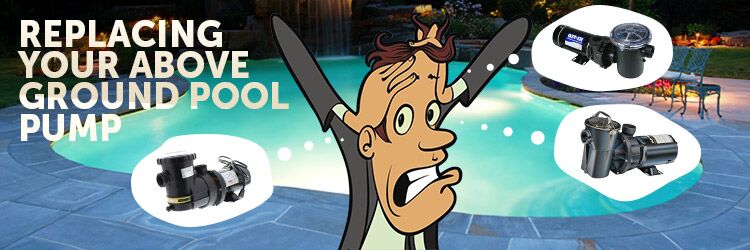

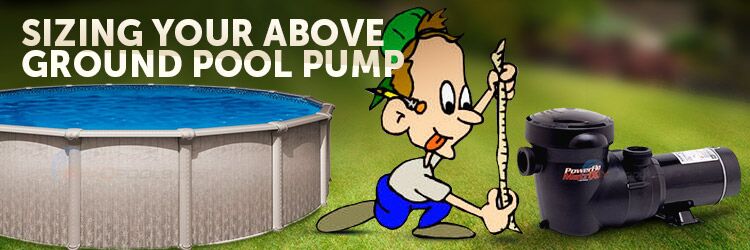








Thank you for the nicely written article. I have replaced my pump about 4 times in the past 32 years, and even put PVC unions on both pipes going to and from the pump to make replacements easier. So, all I needed to do was buy the exact same Pentair pump, and it was a 30 minute job. Then, the 2 largest manufacturers decided that they would give a very short warranty if we do this ourselves, unless a licensed plumber or electrician does the work. My friend is a licensed electrician, and even he can’t understand their policy, as I know more about these pumps than he does. So, to spite them, I bought a pump from someone else.
I wish all of us do-it-yourselfers boycott these companies that short our warranties. Fred Stewart Feld, DMD